&MENTAL HEALTH TAMING ANXIETY
Plus articles on stroke and hearing loss


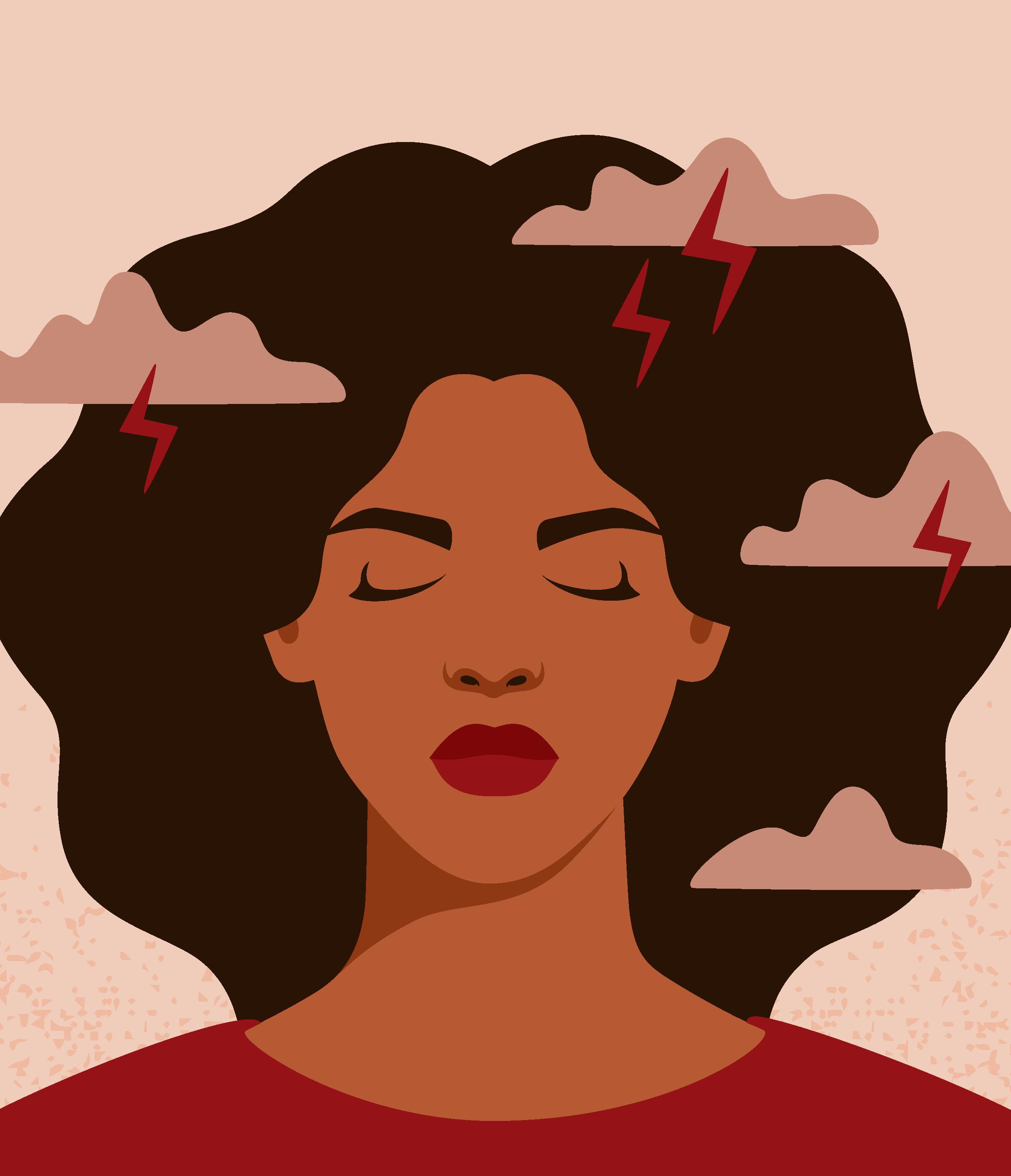
MAY 2023 NEWSLETTER
In our May issue of Your Health, we focus on supporting good mental health for Mental Health Awareness Week, acting FAST on stroke and deaf awareness.
UNDERSTANDING AND TAMING ANXIETY
With Mental Health Awareness Week in May (15th-21st), it is a great opportunity to prioritise mental health in your life (and where you can, in the lives of those around you). This article aims to help you understand what stress and anxiety are and how you can tame anxiety in your personal and professional life.
STRESS
Stress is not an illness itself, but it can lead to people becoming unwell. Stress can affect behaviour and can make you feel low or depressed. Severe stress can cause symptoms such as insomnia and headaches or fatigue and can even exacerbate an existing mental illness.
Stress is not uncommon – most people deal with feelings of stress at some point in their lives. In fact, a study from 2015 found that 59% of adults reported experiencing high levels of perceived stress, and a study from 2017 revealed that fatigue was “significantly associated” with work-related stress (which then can lead to low or reduced energy or motivation).
Some studies suggest that chronic stress may be associated with depression.

ANXIETY
Anxiety is the mind and body’s reaction to stressful, dangerous or unfamiliar
2 | | Your Health Newsletter www.healthpartnersgroup.com
Health Your
situations. It’s the sense of uneasiness, distress or dread you feel before a significant event. A certain level of anxiety helps us stay alert and aware, but for those suffering from an anxiety disorder, it can be completely debilitating.
Anxiety disorders can manifest in many different ways and for a wide variety of reasons from genetics to chronic medical conditions to lifestyle choices. We list some of the most common below.

Anxiety disorders: Anxiety disorders are characterised by a general feature of excessive fear and can have negative behavioural and emotional consequences.
Obsessive-compulsive and related disorders: Obsessive-compulsive and related disorders are characterised by obsessive, intrusive thoughts (constantly worrying about staying clean or about one’s body size) that trigger related compulsive behaviours – such as repeated hand-washing or excessive exercise. These behaviours are performed to alleviate the anxiety associated with the obsessive thoughts.
Trauma- and stressor-related disorders: Trauma- and stressor-related anxiety disorders are related to the experience of a trauma (such as the unexpected death of a loved one, a car accident or a physical assault) or stressor (such as divorce, moving house or a change in job).
MENTAL HEALTH CHARITIES
n Mind: www.mind.org.uk
n Mental Health Foundation: www.mentalhealth.org.uk
n Anxiety UK: www.anxietyuk.org.uk
Your Health Newsletter | | 3 www.healthpartnersgroup.com
MENTAL HEALTH
Health
HOW TO RECOGNISE WORK-RELATED STRESS AND ANXIETY
The key indicators that you may be stressed at work are changes over time, including in your behaviour, performance and physical appearance.
Behaviour changes might include:
• Increased conflict with colleagues;
• Heightened emotions and sensitivity;
• Absenteeism (being off work with no good reason);
• Presenteeism (being at work too much, even if unproductive);
• Difficulty relaxing;
• Increased drug/alcohol use;
• Lack of motivation.
Performance changes might include:
• Declining or inconsistent quality of work;
• Uncharacteristic errors;
• Memory lapses.
Physical changes might include:
• Excessive weight gain or loss;
• Headaches;
• Disrupted sleep pattern or insomnia.
If you notice changes in any of these areas over time, it may be helpful to talk to your manager who might be able to share their own observations and/or make some suggestions for what might be helpful.
STEPS TO REDUCING STRESS AT WORK
The first step to reducing stress in the workplace is to notice that you are struggling. Once you have identified the problem, it is worth clarifying for yourself what, specifically, is causing you to feel stressed at work.
An effective way of doing this is to write down any things that you have found stressful during a working week, how they made you feel and how you reacted.
Once you have acknowledged how you are
Where possible, it is always worth sharing how you are feeling with your manager (if they don’t bring it up with you first).
It might be that simple changes can make a significant difference in making your day-today work life more manageable.
Your manager will also be able to advise you on what work-based support might be available to you.
TAMING ANXIETY AND STRESS
1. Re-evaluate negative thoughts – if you have experienced stress for an extended period, it is more likely that your mind may view situations through a darkened lens and quickly jump to negative conclusions. Tuning into these negative thoughts and implementing techniques to challenge them can be a helpful way of dealing with stress.


2. Get active – research suggests that physical activity improves the way our body learns to handle stress and impacts our production of neurotransmitters, such as dopamine and serotonin, which affect our mood.
3. Spend time in nature –spending time in nature has been shown to have rapid positive effects on our wellbeing. It has been linked to a reduction in cortisol (the primary stress hormone) and an increase in endorphins which promote happiness.
4. Practice mindfulness – the practice of mindfulness helps us to develop more

4 | | Your Health Newsletter www.healthpartnersgroup.com
Your
“The first step to reducing stress is to notice that you are struggling.”
control over our awareness, meaning that we can better identify our internal states and be curious about them. This is helpful when we are feeling overwhelmed and stressed, as it allows us to sit with our feelings rather than react to them.
5. Develop hobbies –hobbies are helpful in reducing stress levels by encouraging us to take some time away from our busy lives to focus on something else. Hobbies can help to make our worlds feel a bit bigger and help us connect with others. Scheduling hobbies can be a fantastic way of ensuring that you actually make time to do things that you enjoy.
HELPFUL RESOURCES
n Citizens Advice
Free, confidential, impartial advice on benefits, housing, debt and other issues.
Telephone England: 03444 111 444
Telephone Wales: 03444 77 20 20
Website: www.citizensadvice.org.uk
n National Debtline

Free, independent, confidential advice about debt.
Telephone: 0808 808 4000. Monday - Friday 9am - 8pm and Saturday 9.30am - 1pm
Website: nationaldebtline.org
n Shelter
A housing and homelessness charity offering specialist advice on a range of housing issues.

Telephone: 0808 800 4444. Monday - Friday 8am - 8pm, and Saturday & Sunday 9am - 5pm
Website: www.shelter.org.uk
n StepChange
Free, confidential advice and support for debt and financial stresses.
Telephone: 0800 138 1111. Monday - Friday 8am - 8pm and Saturday 8am - 4pm
Website: www.stepchange.org
MENTAL HEALTH
n Samaritans
Free, confidential support for people in emotional distress. Open 24/7.
Telephone: 116 123
Website: www.samaritans.org
n Sane UK mental health charity aiming to improve the quality of life of anyone affected by mental illness. Open everyday.
Telephone: 0300 304 7000. 4:30pm - 10:30pm
Website: www.sane.org.uk
n SupportLine

Free help on any issue.
Telephone: 01708 765200
Website: www.supportline.org.uk
n Relate
Relationship counselling.
Website: www.relate.org.uk
Your Health Newsletter | | 5 www.healthpartnersgroup.com
ACT FAST ON STROKE


Stroke strikes every five minutes. It can happen to anyone, of any age, at any time.

A stroke is a brain attack. It happens when the blood supply to part of your brain is cut off. Blood carries essential nutrients and oxygen to your brain, so without blood, your brain cells can be damaged or die.
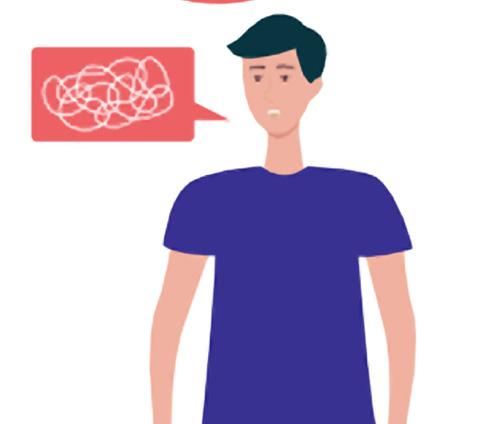
This damage can have different effects, depending on where it happens in your brain. The injury to the brain caused by a stroke can lead to widespread and longlasting health problems. Because the brain controls everything we do and how we think, depending on which part of the brain is injured, a stroke can impact on how the body functions and how you communicate, think and learn. Although some people may recover quite quickly and the effects may be relatively minor, many people who have a stroke need long-term support to help them regain as much independence as possible.
Unfortunately not everyone survives a stroke; that’s why it’s so important to be able to recognise the symptoms and get

Use the FAST test to help identify stroke symptoms.

FACE:
Can the person smile?
Has their face fallen on one side?
ARMS:
Can the person raise both arms and keep them there?

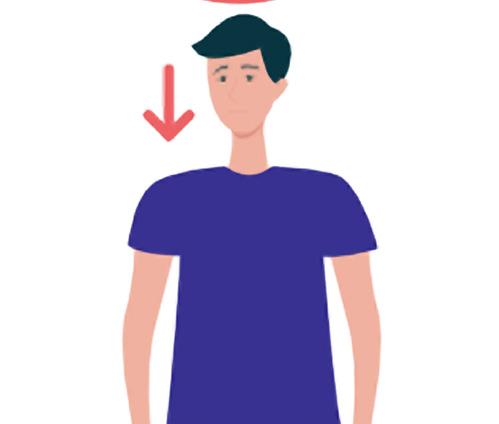
SPEECH:
Can the person speak clearly and understand what you say?
TIME:
If you see any of these three signs, it’s time to call 999.
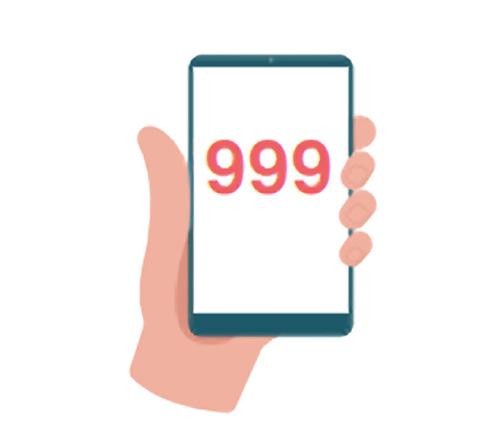
6 | | Your Health Newsletter www.healthpartnersgroup.com Health Your
Health Your
medical help as quickly as possible. The sooner a person receives treatment for a stroke, the less damage is likely to happen.
For many people, a stroke happens suddenly and without warning. A stroke is a medical emergency. If you have any stroke symptoms you need to call 999 immediately.
You may start off in accident and emergency or another assessment ward, but it is likely you will be quickly admitted to an acute stroke unit, which has a range of trained professionals experienced in stroke care. The quicker your stroke is diagnosed and treated, the better your recovery will be.
A brain scan can show what type of stroke you have had. A CT scan or an MRI scan will
show whether your stroke has been caused by a blockage or by a bleed. Because a stroke can happen to anyone, of any age, at any time, it is vital to know how to spot the warning signs of a stroke in yourself or someone else.

There are two main types of stroke:
n Ischaemic stroke: This is caused by a blood clot. Ischaemic means a reduced blood and oxygen supply to a part of the body. It is usually caused by blood clot in an artery, which blocks the flow of blood. This occurs in about 85% of cases;

n Haemorrhagic stroke: This is due to bleeding in or around the brain. A haemorrhagic stroke can happen when an artery inside your brain bursts, causing bleeding within your brain. This is known as an intracerebral haemorrhage.

A TIA or transient ischaemic attack (also known as a mini-stroke) is the same as a stroke, except that the symptoms last for a short amount of time. It is caused by a blockage cutting off the blood supply to part of your brain. This can cause sudden symptoms similar to a stroke, such as speech and visual disturbance, and numbness or weakness in the face, arms and legs. However, a TIA usually often only lasts for a few minutes or hours and fully resolves within 24 hours.
You can find out more about strokes at www.stroke.org.uk.
Sources: Stroke Association, NHS.
Your Health Newsletter | | 7 www.healthpartnersgroup.com ACT FAST ON STROKE
Health Your
WHAT IS HYPERTENSION?
Hypertension (also known as high blood pressure) does not normally have noticeable symptoms. Around a third of adults in the UK have high blood pressure, although many will not realise it.
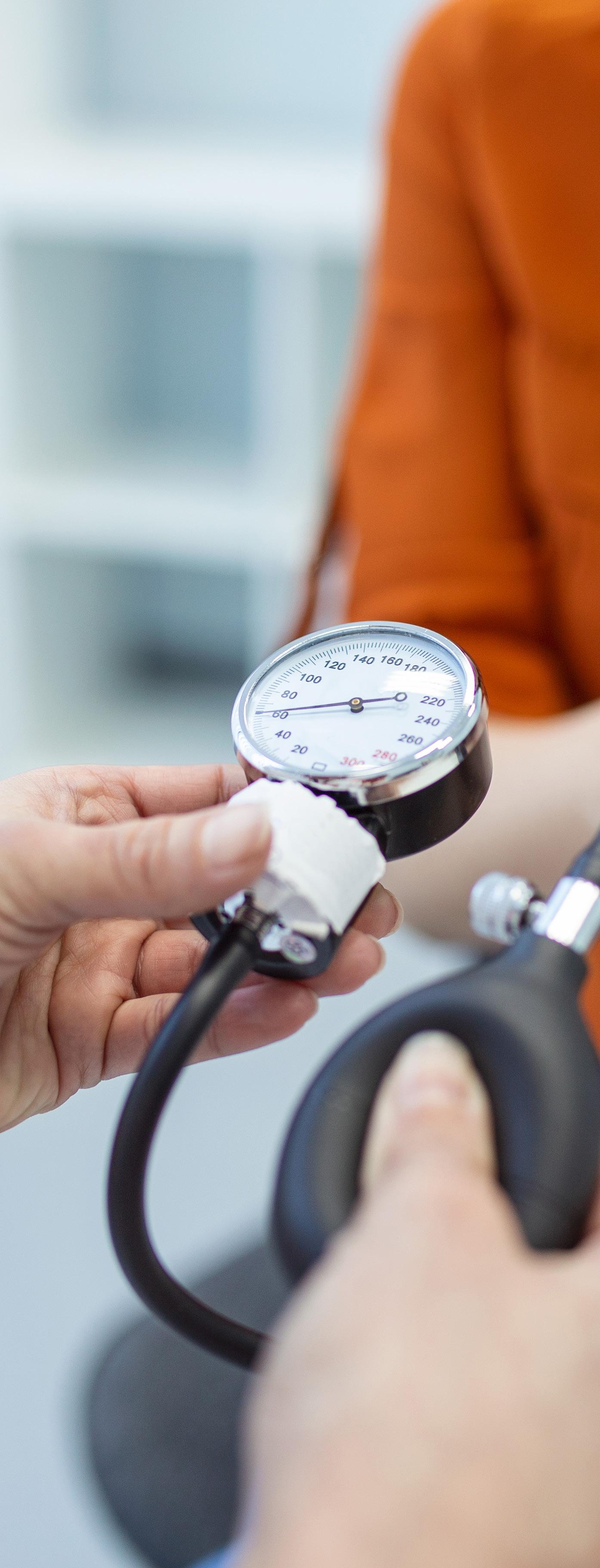
When symptoms do occur, they can include early morning headaches, nosebleeds, irregular heart rhythms, vision changes and buzzing in the ears. Severe hypertension can cause fatigue, nausea, vomiting, confusion, anxiety, chest pain and muscle tremors.
If untreated, hypertension increases your risk of serious problems such as heart attacks, strokes, heart disease, heart failure, peripheral arterial disease, aortic aneurysms, kidney disease and vascular dementia.
The only way to find out if your blood pressure is high is to have your blood pressure checked.
Blood pressure is recorded with two numbers:
n Systolic pressure (higher number) is the force at which your heart pumps blood around your body;
n Diastolic pressure (lower number) is the resistance to the blood flow in the blood vessels.
As a general guide:
n High blood pressure is considered to be 140/90mmHg or higher (or 150/90mmHg or higher if you’re over the age of 80);
n Ideal blood pressure is usually considered to be between 90/60mmHg and 120/80mmHg.
Blood pressure readings between 120/80mmHg and 140/90mmHg could mean you’re at risk of developing high blood pressure if you do not take steps to keep your blood pressure under control. Everyone’s blood pressure will be slightly different. What’s considered low or high for you may be normal for someone else.
https://media.istockphoto.com/id/1217889729/photo/man-running-outdoors-running-checking-smart-watch-taking-a-break.jpg?s=612x612&w=0&k=20&c=jNB3H2ZiFnhaW1pQJdZ0gVMP1GajiOTuOZe76G0CkAk= 8 | | Your Health Newsletter www.healthpartnersgroup.com
WHAT IS HYPERTENSION?
You might be more at risk of hypertension if you:
n Are overweight;
n Eat too much salt and are not eating enough fruit and vegetables;
n Are not doing enough exercise;
n Are drinking too much alcohol, coffee or other caffeinated drinks;
n Smoke;
n Are not getting much sleep or having disturbed sleep;
n Are over 65;
n Have a relative with high blood pressure;
n Are of black African or black Caribbean descent;


n Live in a deprived area.
Reducing high blood pressure
Making healthy lifestyle changes can sometimes help reduce your chances of getting high blood pressure and help lower your blood pressure if it’s already high.
Examples include:
n Reducing the amount of salt you eat (<5g per day);
n Having a generally healthy diet;
n Limiting the intake of foods high in saturated fats, e.g. animal fats, butter, cheese, processed meats;
n Eliminating/reducing trans fats in your diet, e.g. margarine, some cooking oils, pastries;
n Cutting back on alcohol;
n Losing weight if you’re overweight;
n Exercising regularly;
n Cutting down on caffeine;
n Stopping smoking;
n Reducing stress;
n Regularly checking your blood pressure.
Doctors can help you lower and maintain your blood pressure at a safe level using lifestyle changes and/or medicines.

What works best is different for each person. Talk to your doctor to help you decide about treatment.
Sources: WHO, NHS, Diabetes.co.uk, OptingHealth
https://media.istockphoto.com/id/1217889729/photo/man-running-outdoors-running-checking-smart-watch-taking-a-break.jpg?s=612x612&w=0&k=20&c=jNB3H2ZiFnhaW1pQJdZ0gVMP1GajiOTuOZe76G0CkAk= www.healthpartnersgroup.com Your Health Newsletter | | 9
DEAF AWARENESS
Deaf Awareness Week (1-7 May 2023 in the UK) is designed to raise awareness of the experiences of deaf people, whilst promoting social inclusion of those with hearing loss. Hearing loss affects 12 million people in the UK, and one in five adults (20%) have hearing loss. Hearing loss happens for a variety of reasons, including neurological and physiological factors.
There are many ways to create a network of support for the deaf community and those with hearing loss. Methods of support include:
n Improve accessibility in a meeting setting through the use of sign language interpreters, captioning/subtitles, and assistive technology;
n Query how colleagues prefer to communicate – asking is the best way to establish the optimal support an individual requires;
n Consider the use of subtitles and/ or transcription for e-learning and other training materials;
n Recognising that not all individuals who are deaf or have hearing loss have the same hearing experience.
If you are concerned about your hearing, speak to your GP in the first instance.
Scan Health Partner’s unique QR code to check your hearing with RNID’s free online test or go to rnid.org.uk/informationand-support/takeonline-hearing-check/

Sensorineural hearing loss: This is caused by damage to the hair cells inside the inner ear, or damage to the hearing nerve, or both. It makes it more difficult to hear quiet sounds and reduces the quality of sound that you can hear. Sensorineural hearing loss is permanent, but can often be treated with hearing aids.

Conductive hearing loss: This happens when a blockage, such as ear wax, stops sound passing from your outer ear to your inner ear. Sounds will become quieter

10 | | Your Health Newsletter www.healthpartnersgroup.com
Health Your
“Hearing loss affects 12 million people in the UK – 1 in 5 adults are deaf or have hearing loss.”
and things might sound muffled. It can be temporary or permanent. Conductive hearing loss is usually caused by ear problems.
Other types of hearing loss
Age-related hearing loss: Age-related damage to the inner ear is the single biggest cause of hearing loss. It’s also known as presbycusis. Most of us will experience some level of hearing loss as we age. This type of hearing loss tends to affect both ears and increases with age. The main cause of age-related hearing loss is gradual wear and tear to tiny sensory cells called ‘hair cells’ in the cochlea (your hearing organ in the inner ear). Your hearing might start to deteriorate with age, which makes high-frequency sounds, such as some voices, difficult to hear. It might also be harder to hear ‘s’, ‘f’ and ‘th’
sounds in words, which can make it hard to understand what people are saying. There is no cure for age-related hearing loss, but many people find hearing aids to be a huge help.
Sudden hearing loss: Sudden hearing loss can affect one or both ears. It can happen instantly or over the course of a few weeks, and you might also have tinnitus or balance problems. Recovery from sudden hearing loss will depend on the cause and how badly you’re affected. Causes can include ear wax, infections, trauma, ototoxic drugs, acoustic neuromas and Ménière’s disease.
If you suddenly lose hearing in one or both ears, you should contact NHS 111 or your GP as soon as possible. Your hearing loss might not be serious, but it can be a symptom of a medical emergency. If this is the case, there is a very short window of time for treatment.

Your Health Newsletter | | 11 www.healthpartnersgroup.com DEAF AWARENESS
Noise-induced hearing loss: Exposure to loud noise is the second biggest cause of hearing loss. Noise-induced hearing loss is caused by being around very loud noises for a long time. This could include being in a noisy workplace, listening to loud music, loud bursts of sound, like gunshot or explosions. You might not notice the effects of noise-induced hearing loss until years after you were first exposed to loud noise.
Tinnitus: Some people experience tinnitus as the first sign that their hearing has been damaged by noise. Tinnitus is the name for hearing noises that are not caused by an outside source. It’s common – around one in eight adults in the UK have tinnitus all the time or regularly. Most often, tinnitus is linked to hearing loss or other ear conditions. It’s rarely a sign of a serious condition.
Most cases of tinnitus are linked to hearing loss caused by damage to the inner

ear, such as through normal ageing or exposure to loud noise. This type of hearing loss is called sensorineural (see page 10).

Less commonly, tinnitus is linked to hearing loss caused by a blockage or ear condition that affects the outer or middle ear and stops sound waves from passing into the inner ear. This type of hearing loss is called conductive.
To prevent noise exposure, it’s best to avoid loud sounds at work, at home or when you go out. There are steps you can take to protect your hearing.
Deaf people and those with hearing loss have individual communication needs and you should ask someone how best you can communicate with them.
Read more about how you can improve communication at RNID’s website.
Sources: RNID, NHS
NEXT ISSUE:
n Diabetes
n Cervical Screening

n Men’s Health
At Health Partners we offer a full range of tailored health and wellbeing services.
Our thinking is innovative. We constantly develop new responses and tools designed to address the health and wellbeing challenges that face your business and people.
Our commitment is total. We invest in our services, creating new ones and keeping in step with every client. We constantly explore new ways of working and make no compromises in the quality of our services.
Simply put, we are here to help people be their best.
12 | | Your Health Newsletter www.healthpartnersgroup.com
Your DEAF
Health
AWARENESS


























